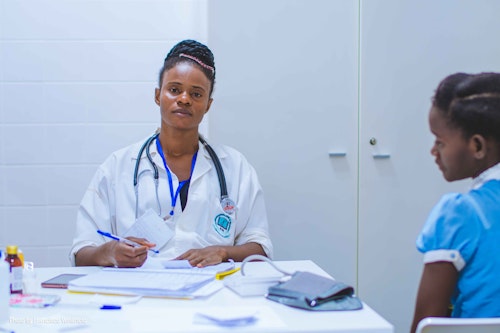All you need to know about the first WHO-approved malaria vaccine, RTS,S (Mosquirix)
Written By
Joy EmehHuman Anatomist | Health Editor

Clinicians and the general public have been excited about the news of the first malaria vaccine (RTS, S), which the World Health Organization (WHO) approved in October 2021.
Malaria is an infectious disease carried by the malaria parasite Plasmodium". Five Plasmodium species cause malaria: P. falciparum, P. malariae, P. ovale, P. vivax, and P. knowlesi. The first two are the most common malaria-causing culprits.
The Plasmodium parasites commonly infest the female Anopheles mosquito, which feeds on humans. People develop malaria when a mosquito infected with the Plasmodium parasite bites them, thus transmitting the parasite to them.
Malaria is a killer disease. The world, especially the sub-Saharan area, has been trying to get rid of this disease for many years, but it keeps spreading among populations
According to the Centres for Disease Control (CDC), malaria is a threat to 87 countries and territories. Africa is the most affected because the Anopheles gambiae mosquito, responsible for high malaria parasite transmission, thrives there. Also, the weather condition in Africa favours the spread of malaria.
Even though the number of malaria cases and deaths has declined in recent years, this disease still poses a threat to many communities.
The World Health Organisation (WHO) reported an estimated 229 million malaria cases worldwide in 2019. The estimated number of malaria deaths was 409,000 in 2019. 94% of the malaria cases and deaths were from Africa, and Nigeria bears 23%.
The population groups at a higher risk of malaria include infants, children below the age of 5, patients with HIV and AIDS, travellers and pregnant women. In endemic areas, malaria may cause up to 10% of all deaths in children.
Broad rollout of the new malaria vaccine in 2021
The key strategy for malaria control has been the use of insecticidal nets, treatment with artemisinin-based medicine combinations and active research into effective malaria vaccines.
The first attempt at malaria control was over three decades ago, when people were vaccinated using high doses of irradiated sporozoites. This vaccination was considered impractical. Scientists have continued trying to develop an effective vaccine against malaria. None was approved until recently.
The good news is that we now have an approved vaccine for malaria. In a news release on 6th October 2021, the WHO recommended a new malaria vaccine for children at risk of malaria.
Photo by Mufid Majnun on Unsplash
The name of the malaria vaccine approved by the World Health Organisation is RTS,S/AS01 (RTS,S). RTS,S is a vaccine that fights against Plasmodium falciparum, a deadly malaria parasite prevalent in the sub-Saharan African region.
This newly approved malaria vaccine (also called Mosquirix) was developed by the British pharmaceutical company GlaxoSmithKline (GSK.L).
Mosquirix is a result of 30 years of research by GSK through a partnership with PATH and with the support of other stakeholders and various African research centres.
The vaccine recommendation was made based on results obtained from a pilot study still ongoing in Kenya, Ghana and Malawi. The study started in 2019 and has extended to more than 800,000 children.
The approved malaria vaccine is only about 30% effective in reducing severe malaria cases. Therefore, health experts have stressed that all malaria interventions (including the use of insecticides and treated mosquito nets) remain vital.
Who is the malaria vaccine (RTS,S) meant for?
The WHO recommended RTS,S malaria vaccine for infants and children in areas at risk of malaria. This includes children in sub-Saharan Africa and other regions with moderate to high transmission of the malaria parasite. The vaccine program will be added to the existing malaria control strategies.
The WHO report read:
P. falciparum
.
According to the WHO, some countries that carry a high malaria disease burden include Burkina Faso, the Democratic Republic of the Congo, Nigeria, Cameroon, Ghana, Mali, India, Niger, Mozambique, Uganda and the United Republic of Tanzania. As a result, children living in malaria-endemic areas will be prioritized.
Since the RTS,S vaccine has the potential to reduce childhood deaths, it will be scheduled for administration in four doses for infants and children as young as five months old in these countries and other countries moderately affected.
Why the newly approved malaria vaccine is not for adults
Photo by CDC on Unsplash
More than 2.3 million doses of the RTS,S malaria vaccine have been administered in 3 African countries. But the vaccine is meant to be administered to children, not to adults.
Why are adults not involved in the newly approved malaria vaccination scheme?
The various phases of the RTS,S trial involved children and infants because they are the population group targeted for the malaria vaccination program.
Children have not yet built up immunity to parasitic infections like malaria unlike adults. Therefore, children are more at risk of dying from malaria. Hence, the urgency in developing a vaccine that will reduce the occurrence of malaria in children.
Distribution of the malaria vaccine in Africa
Reuters reported that the African Union would start talks with the World Health Organisation on how to roll out and distribute the approved malaria vaccine to African countries.
According to the Director of the African Centres for Disease Control and Prevention, John Nkengsong, the organization doesn't know when the vaccine will be accessible to the African countries that need it most.
The director also added that it is not clear how quickly GSK will scale up the vaccine's production. Also, the cost per dose is not yet known.
The lack of resources to help roll out the malaria vaccine in African countries is one of the biggest challenges that will need to be solved. If African countries quickly adopt the vaccine, its speed of deployment may be faster.